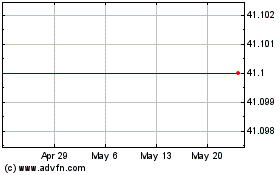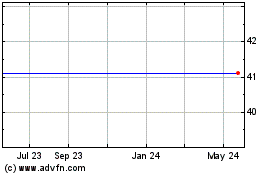Texas Instruments Inc. (TXN) said it will transfer its stock
listing to the Nasdaq Stock Market from the New York Stock Exchange
early next year, the latest episode in the stock exchanges' heated
listings battle.
While the transfer provides the tech-heavy Nasdaq a high-profile
score, it also highlights how transfer-minded companies are taking
advantage of Nasdaq incentives with a close eye on the bottom
lines. Both stock exchanges have battled for years to bring in, or
poach, listings by offering promotions and other incentives.
Texas Instruments, which is ending a run of nearly 60 years on
the Big Board, is the second household name to switch to Nasdaq OMX
Group Inc.'s (NDAQ) company list this week. On Tuesday, fast-food
restaurant chain Wendy's Co. (WEN) said it was also leaving the Big
Board to join Nasdaq. Both companies cited cost savings for the
moves.
Texas Instruments's move to Nasdaq "is a natural fit," said Ron
Slaymaker, head of investor relations at the global semiconductor
company. The company has been listed on the New York Stock Exchange
since 1953.
A Texas Instruments spokeswoman said the transfer will be more
cost effective than staying on NYSE, but she wouldn't disclose
specific cost-saving amounts.
Last week, Texas Instruments lowered its fourth-quarter earnings
guidance, citing broadly lower demand across most of its markets.
Shares closed up 1.7% at $28.51. The stock is down 12% this
year.
Texas Instrument shares will begin trading as a Nasdaq-listed
security on Jan. 3. It will continue to trade under the current
ticker symbol, TXN.
"It's been a privilege to serve the company and its
shareholders," an NYSE Euronext (NYX) spokesman said regarding
Texas Instruments.
Texas Instruments is the biggest company to transfer from NYSE
to Nasdaq this year and one of the biggest ever. In 2009, Vodafone
transferred its U.S.-traded equity from NYSE to Nasdaq, which
accounted for $13.2 billion of the company's $112 billion market
capitalization, according to Patrick Healy, chief executive of
Issuer Advisory Group, which consults with companies contemplating
a share listing.
The switch comes at a time of year when more companies typically
transfer their stock listings from one market to another. Annual
listing fees are typically paid at the beginning of the new
year.
Viacom Inc. (VIA, VIAB) earlier this month switched to Nasdaq
from the Big Board. The media company, which operates channels like
MTV and Comedy Central, also cited cost savings for the
transfer.
Meanwhile, Prosperity Bancshares Inc. (PRSP) late Wednesday
announced intentions to transfer listings to the New York Stock
Exchange from Nasdaq.
The larger companies, measured by shares outstanding, pay higher
fees on NYSE than smaller ones. A company can pay up to $500,000
for an NYSE listing fee, while all Nasdaq fees are capped at about
$100,000.
There have been seven companies, with a combined market
capitalization of $78 billion, that have moved to Nasdaq from the
Big Board this year, according to Healy. By contrast, 12 companies
have moved to the Big Board from Nasdaq. But they have a combined
market capitalization of only $29 billion.
"When your fees come due on Jan. 1 and you're listed on NYSE,
the bigger companies are going to pay the higher fees," Healy said.
"If you want to cut costs, what do you do? In the fourth quarter,
you make your move."
Additionally, Nasdaq offers incentives for companies going
public as well as Big Board transfers. Companies with market
capitalizations of at least $500 million are eligible to receive
four years of Nasdaq-listing services if they transfer from NYSE to
Nasdaq, according to a Securities and Exchange Commission filing
dated Sept. 12. Two years of free services are offered to new
companies going public if they list on Nasdaq.
These services, which include investor relation products, press
release distribution and other shareholder services, are valued at
approximately $169,000 per year, the filing said.
NYSE said companies shouldn't decide where to list their stock
based solely on particular incentives.
"We don't believe any company should be choosing an exchange
based solely on these services," said David Ethridge, senior vice
president and head of capital markets at NYSE. "Our market brings
more significant, tangible benefits in terms of visibility, global
reach and dedicated capital from our designated market makers."
A Nasdaq spokesman said its "corporate solutions" services "help
listings be better public companies."
In addition to traditional market-quality issues such as
liquidity and bid-ask spreads, so-called visibility issues now play
a key part in the listing equation. Promotional efforts to raise
corporate profiles, including events like the NYSE's or Nasdaq's
opening and closing bell ceremonies, largely factor into a
company's decisions on where to list its stock.
Much of the rivalry between the exchanges this year has focused
on grabbing the listings of newly public companies, including the
high-profile crop of technology initial public offerings. The New
York Stock Exchange recently landed professional social-networking
site LinkedIn Corp. (LNKD), Internet radio site Pandora Media Inc.
(P) and Chinese social networking site Renren Inc. (RENN).
Nasdaq scored Groupon Inc. (GRPN), social gaming company Zynga
Inc., which is expected to start trading on Friday, and the planned
Expedia Inc. (EXPE) spinoff TripAdvisor Inc.
-By Steven Russolillo, Dow Jones Newswires; 212-416-2180;
steven.russolillo@dowjones.com
--Tess Stynes and Brendan Conway contributed to this
article.
Prosperity Bancshares (NASDAQ:PRSP)
Historical Stock Chart
From Apr 2024 to May 2024

Prosperity Bancshares (NASDAQ:PRSP)
Historical Stock Chart
From May 2023 to May 2024
